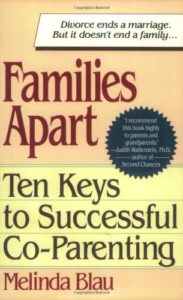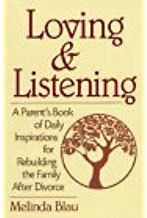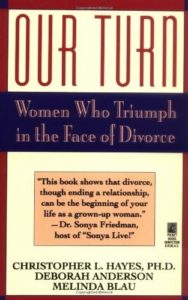Divorce is a leap into the unknown, certainly not as joyful as new parenthood but just as disorienting and life-changing. It’s a time we need help. I know, because I’ve been there. Although we know much more about divorce and its fallout than we did twenty years ago when I first began to write books on the subject, the process hasn’t gotten any easier.

Families Apart: Ten Keys to Successful Co-Parenting
When this book came out in 1994, co-parenting was a somewhat radical idea. I have thought about trimming and updating this title, turning it into an ebook and perhaps an app. But if you’re going through a divorce now, don’t wait for the revised edition! Although twenty-plus years have elapsed, the ten “keys” stand the test of time. For example, you still need figure out how to get past the hurt (#1, “heal yourself”), to “act maturely” (#2), to “listen to your children” (#3) and to “respect each other as parents” (#4) which happens when you start seeing your former spouse as your coparent, not simply your “ex.” And even though we have come a “long way” in redefining men’s and women’s capabilities, most divorcing couples still need to “step out of your gender roles” (#8). Mom needs to know how to mow the lawn and Dad can’t be squeamish about discussing his daughter’s period. Taken together, the keys will help you move on and enable all of you adjust to your new family apart.

Loving and Listening: A Parent’s Book of Daily Inspirations for Rebuilding theFamily After Divorce
This is a book of daily meditations, a companion volume to Families Apart. Each day focuses on a common personal and/or spiritual issue that challenges divorced parents. Healing happens in small steps. Read this book every day, give yourself a few minutes to ponder the message and put it into play. Eventually, you will become better at communicating honestly with your children (and the other parent) and at helping your kids see that they are still part of a family.

Our Turn: Women Who Triumph in the Face of Divorce
In the early nineties, I collaborated with psychologist Christopher Hayes, Director/National Center for Women and Retirement Research, his research fellow Deborah Anderson, who conducted the “Divorce Over 40” study on which the book is based. Many of the participants went to college hoping to collect an “MRS” degree; they cared more about finding a “good provider” than going out to work themselves. However, this retrospective look at marriages that dissolved after twenty years or more is still relevant today.
Our Turn illuminates the pitfalls and struggles of women who leave or are left. Most important, it highlights the surprising benefits of life after divorce. While the study focused on the Baby Boom generation, it offers insights for all women, showing how personality and life experience affect recovery after divorce–and how to seek healthy, productive ways to promote healing. As Publishers Weekly wrote, “Rather than collapse in despair, 82% of 350 middle-aged, white, middle-class divorced women involved in this study were found to “thrive” on divorce, spurred to forge rewarding, new professional and emotional lives…[They] tapped repressed or dormant inner resources, developed self-confidence and revived or developed relationships with family members and friends. Despite sharply reduced income, they pursued new interests and often discovered professional or sexual fulfillment without a compulsion to remarry. Women facing divorce will find encouraging words and [valuable advice here.”